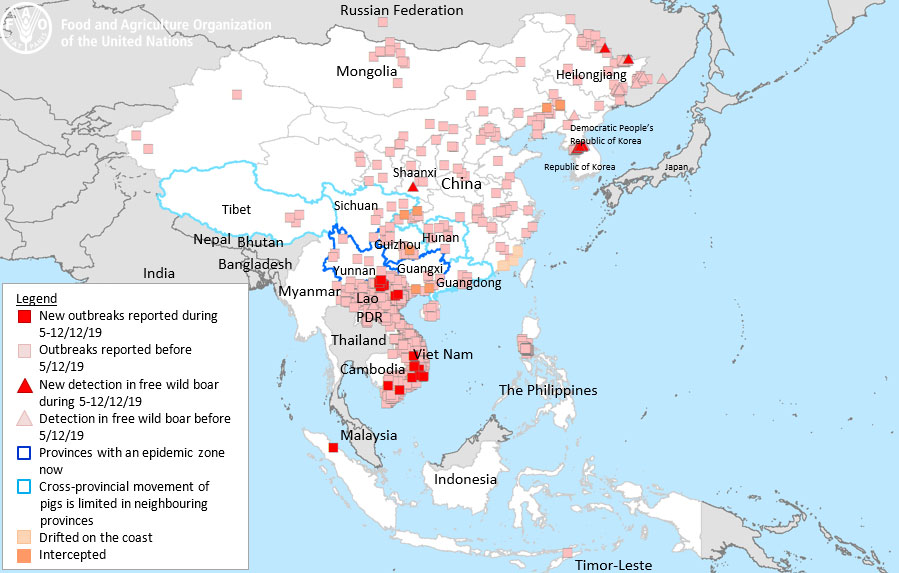ASF still spreading through Asia
The latest update on the ASF situation in Asia released by the UN's Food and Agriculture Organization shows that the virus keeps spreading in the region despite the efforts made by several governments. The map released with the report indicates several new countries affected by the disease and FAO have already deployed in October an EMC-AH preparedness assessment mission to Papua New Guinea to assess ASF preparedness and response strategy.
Currently, the disease is present in China, Mongolia, Vietnam, Noth Korea, South Korea, Cambodia, Laos, the Philippines, Timor-Leste, Indonesia and Myanmar.

China and Vietnam are the far worst affected countries in the region, with losses reported in their pig inventory of 30% (Vietnam) and 50% (China). The decline in their national pig herds has created a huge deficit of meat in the market and the situation could become even worst in the years to come. So far, biosecurity measures have been adopted by the governments and large scale producers along the culling of the swine population in the areas affected. The Chinese Ministry of Agriculture updated regulations on pig slaughterhouses: It task pig slaughter enterprises to conduct self-inspection by using PCR. If ASF is detected, the slaughtering enterprise should stop production for 48 hours, then apply for evaluation to resume production.
In Korea, to prevent ASF spread to southern parts of the country, officials from the Ministry set a buffer zone (outside the 10km radius of affected farms) that is separating the affected zone from the southern free zone; controlling the traffic of feed vehicles between zones. On 27 October, an enhanced emergency measure reinforcement plan was released; including installation of a wide-area fence from west to east side of the country and the use of firearms in the buffer zone to drive wild boars. Currently, a joint public-military intensive surveillance is going on within the newly developed fences.
Vietnam is fighting not only against the disease but also with a very active black market for pig meat in the region. "Vietnam has implemented movement control of pigs and pig products from affected communes. The Central Committee of the Communist Party issued a Directive to strengthen their leadership and operational instructions for effective ASF response, control and prevention. National Steering Committee for ASF prevention and control requested National Steering Committee against smuggling and People's Committees of provinces to conduct measures to prevent, promptly detect and strictly handle cases of smuggling, illegal transportation, trafficking of animals, animal products, especially pigs and pig products into Vietnam," according to FAO document.
The institution recommends that animal disease containment in its broadest sense should be prioritized within the highest levels of governments;
Preparedness (e.g. contingency planning, standard operating procedures— SOPs, secured financial support) for improved early warning, detection and notification, early reaction, and coordination needs to be in place and reviewed periodically in relation to changing disease situation;
Application of strict biosecurity measures specific to the different swine producing sectors including frequent cleaning and disinfection of farms, transport vehicles, and improved husbandry practices and production systems;
Strengthening surveillance and monitoring of transport of live pigs as well as pork products;
Good communication and coordination with swine producing commercial sector and swine famers are essential to strengthen cooperation in ASF prevention, detection, and control. Awareness and training of all stakeholders, from veterinarians to farmers, intermediaries and other value chain actors is needed;
Communication to public is to be in place to avoid the rumours leading to food safety perceptions and consumption disruption;
Farm registries, animal identification and censuses are essential to enable animal health interventions;
Prohibition of swill feeding where feasible; highly regulated where not;
Strengthening proper disposal of food waste (food services, airports, seaports), which may contain uncooked pork products;
Outbreak control strategies must be in place. The strategies need to be developed in consultation with the private sector (pig producers and allied industries, such as transport, feed operators) for improved disease management options and compliance.
The ASF crisis in Asia is expected to reach its peak in 2020 and 2021, according to analysts but the real danger resides in getting other regions around the globe contaminated with the virus: such as South America, North America or Australia and New Zealand. The disease is also present in Europe.
As a result, the Restocker Lamb Indicator price has risen to 735¢/kg carcase weight (cwt) wh...

This moving production highlights the essential role of generational change in the Spanish countr...

During the meeting, the sector expressed its concern about the serious consequences that the...
